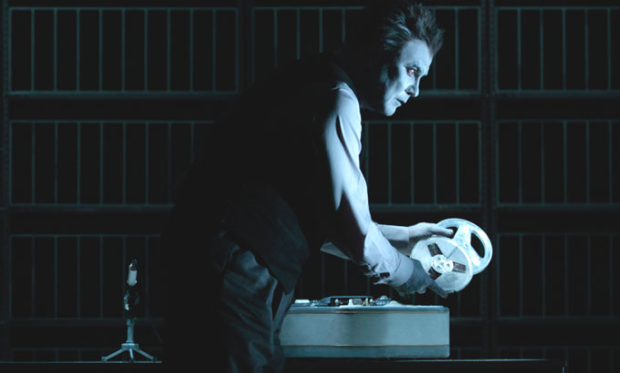Krapp’s Last Tape (Barbican Centre)

© Lucie Jansch
Of all Samuel Beckett’s characters, Krapp is among the most human. Unlike the Godot boys or Endgame‘s Hamm, unlike Mouth or Winnie, he – Krapp – could belong to our world. Others are creatures of the stage, born and bred in Becketville. Krapp could live next door.
As such, actors usually downplay this old man with a tape recorder. Robert Wilson, the legendary American avant-gardist, does something completely different. He pushes Krapp all the way into metaphor: no longer a man, but the image of a man.
Something akin to naturalism becomes expressionistic, crisp as a graphic novel or film noir. Krapp’s study has become a bunker, with tiny windows up high and the clinical feel of a CSI lab. He has a clown’s white face and, when not staring ahead, blank as a waxwork, he bursts into giant, cartoonish expressions: gleeful one moment, aghast the next.
That reinvention revitalises Beckett, making it unfamiliar once again and, if Wilson loses the heavy-heartedness of old age, he pinpoints its existential horror. Moreover, he lets you feel it. This is agonisingly slow – the banana appears 20 minutes in – and it’s soundtracked by a fierce, grating rainstorm that sounds like the background crackle of a cassette. It’s like being sandblasted and by the time silence falls, you’re entirely grateful for it. Like Krapp, you come to appreciate the act of listening.
Wilson’s Krapp is effectively petrified. As well as the white, white face – so white it’s glow in the dark green – his hair is not dishevelled as Beckett demands, but standing on end, starch-stiff. With every ear-splitting thundercrack, Krapp freezes, neither daring to blink or breathe. His banana becomes a gun, pointed at the world in self-defence while backing away. He eats it like a small animal scanning his surroundings for predators.
It’s never entirely clear what Krapp’s afraid of – death, the world, other people – but nor it does it need to be. It might be everything or nothing. The point is that acute fear has brought Krapp to a standstill. It has stopped him living in the present and left him fixated on his past. Combined with the OCD precision of this ritual, Krapp seems to have suffered some trauma.
Is that, perhaps, what he’s searching for? Some trace, some clue, some explanation. As the tapes play, Wilson sits there, eyes like slits, face absolutely frozen and unreadable. It’s utterly ambiguous: is he caught in memory, seeing the past all over again, or is he searching for that memory, unable to recall the events, feelings and people that his younger self, this clean-cut voice, is talking through?
Some will, undoubtedly, miss the intricacy of his reactions to words spoken 30 years earlier. Wilson hoots and blarts and honks his responses instead and it can feel shallow. However, the perfect ambiguity of his face, when still, is recompense enough. It makes Krapp a mystery, not just a man.
Krapp’s Last Tape ran at the Barbican until 21st June.










